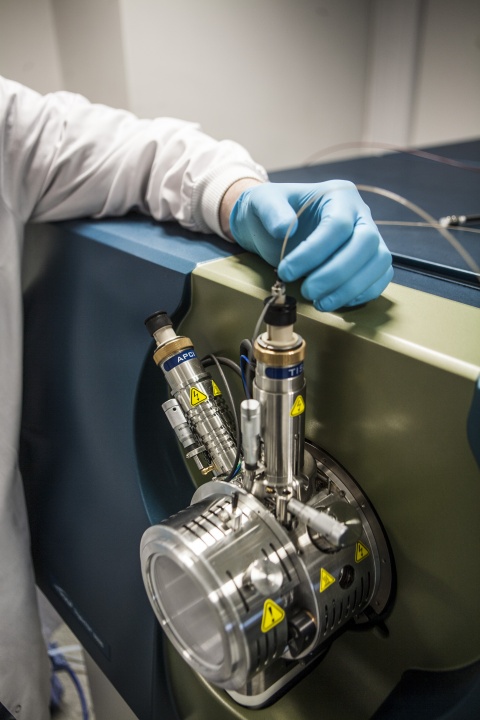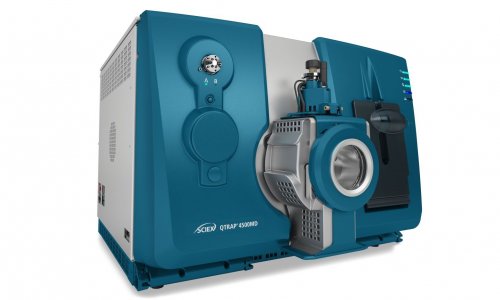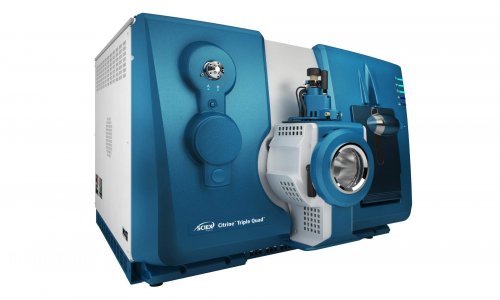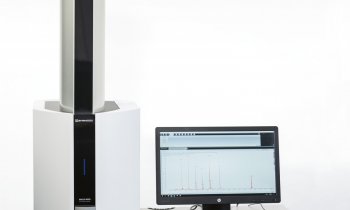Article • Prostate Cancer
Proteomic mass spectrometry
Scientists at a UK university are using the power of mass spectrometry to research critical processes in human prostate cancer.
Report: Mark Nicholls
Dr David Boocock is leading a group at the John van Geest Cancer Research Centre at Nottingham Trent University, with a key research focus on the discovery of new markers that can predict prostate cancer metastasis. he research will feed into the immunotherapy stream of the centre.
‘We have been working on creating and characterising a model that can help us predict prostate cancer metastasis,’ he explained. ‘To do this we have cloned prostate cancer cell lines to generate new cell lines that have varying degrees of EMT (epithelial to mesenchymal transition), which is thought to be a critical process in cancer invasion and migration that relates to metastasis.
‘We generated a cell line that undergoes a “spontaneous” transition from epithelial to mesenchymal phenotype, which we believe may better represent the biological process in cancer than current methodologies that use exogenous factors to induce EMT in vitro.’
This work was recently published in Nature Publishing Group’s Scientific Reports (http://www.nature.com/articles/srep40633)

For his research Dr Boocock, Senior Research Fellow and Group Leader in Clinical Proteomics and Biological Mass Spectrometry in the John van Geest Cancer Research Centre, primarily uses proteomic mass spectrometry (Next-Gen Proteomics) to look for differentially expressed proteins between different samples. ‘At the most basic, it’s comparing cancer and non-cancer samples to identify cancer related proteins,’ he explained, ‘but, we also have looked at response to therapy and prediction of disease status.
‘To do this, we use quantitative mass spectrometry to measure the differential expression of the peptides/fragments of proteins following high performance liquid chromatography (HPLC) of the complex samples.’
Boocock reports significant findings result from the model developed in the present work, which provide a valuable resource for the investigation of EMT in human prostate cancer. ‘Unlike artificially-induced models of EMT,’ he added, the EMT derived cells in this study express endogenous levels of EMT-associated proteins. As such, these clones can be utilised to derive an authentic EMT-signature, which could be extended to clinical applications. These cells have been studied in vivo, using a mouse xenograft model, which showed that the clone with high spontaneous EMT gives rise to a much larger, faster growing tumour.’
For the studies, the instrumentation from Sciex, used by Boocock, includes the TripleTOF 6600 and 5600+ mass spectrometers, along with the Eksigent 400 series nanoLC HPLC system.
He said the TripleTOF system allows him to identify 3-3,500 proteins in a complex cell lysate with an hour’s gradient and then use the information to create a ‘spectral’ or ‘ion’ library for that specific sample type.

From there, using a different technique called SWATH, or Data Independent Acquisition (DIA), his team can gain quantitative information on every protein in the sample (up to 4,500 in an hour’s LC gradient). This enables us very quickly to run a batch of samples with two or more classifications - cancer; non-cancer, or aggressive vs. non-aggressive, for example - and get a relative quantitative readout for each protein.
‘Sciex provides an excellent cloud based software platform (OneOmics), which has revolutionised the laboratory throughput and allows us to upload our raw data and process it far faster than would be possible locally, with a great user interface.’
At present, while the studies are at an early stage, a next step is the continuation of the work with novel prostate cancer cell clones. With the full transcriptomic and proteomic (SWATH) characterisation of the cell lines under way and several key molecular drivers of EMT and metastasis already identified from the date, the group is working toward further publications in the near future.
‘These clones provide a significant resource and considerable scope for future studies that are focused on interrogating the fundamental mechanisms involved in cancer progression. They will also be of significant value for studies based on biomarker discovery and the identification of drug-able or immunotherapeutic targets that can be exploited to develop new approaches for prostate cancer treatment and management.
Profile:
Dr David Boocock is a Senior Research Fellow and Group Leader in Clinical Proteomics and Biological Mass Spectrometry in the John van Geest Cancer Research Centre at Nottingham Trent University. With his colleagues, his research focuses on three main areas of cancer – prostate, breast and leukaemia – in both biomarker discovery and cancer immunotherapy. It incorporates state-of-the-art technologies for discovering the genetic basis of the disease and developing new methods of diagnosis and treatment. His research on biomarker discovery utilises biological mass spectrometry to identify protein biomarkers as predictors of disease status and response to therapy, particularly in prostate and breast cancer.
30.03.2017











